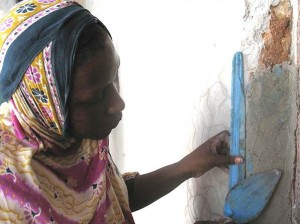An editorial in the Kenyan newspaper THE NATION (October 21) quoting from the Tanzanian paper The Citizen wrote: ‘Hardly a day after President Kikwete called for a crackdown to stem the killing of albinos another horrendous case was reported. An albino girl was on Sunday night slain in Kahama, Shinyanga. It’s not surprising that the story has gone all over the world. The international community is rightly puzzled about the madness that has befallen our country. That the killers stormed the Standard Three pupil’s home, killed her and chopped off her body parts before the very eyes of her terrified parents, speaks volumes about how cruel and inhuman these criminals can be. Serious measures must be taken now to stem the killings. Police cannot be everywhere, but the wananchi can. We should unite to fight the primitive acts by criminals driven by senseless superstition’ – Thank you Keith Lye for sending this – Editor.
Tanzania has a large population of refugees from neighbouring countries and London’s GUARDIAN WEEKLY REVIEW (September 26) devoted a piece under the headline: ‘Last of the exiles return’. Extracts: ‘Peace has now returned to Burundi, and many who fled 30 years ago are returning home. 85-year-old Michael Bihonzi is among many who fled the ethnic massacres that started in 1972 and which consequently left up to 200,000 people dead, reports Xan Rice. Bihonzi, who found peace and safety in a Tanzanian refugee camp, climbed on board a truck with 23 of his children and grandchildren, and headed across the border with a cash grant of $40 from UNHCR, the UN refugee agency that is managing the repatriation effort. ‘More than 450,000 refugees have already returned. Now, with the last active rebel group in Burundi showing willingness to lay down its arms […] Tanzania has decided to close its remaining refugee camps near its western border.’
In an exclusive interview, AFRICA REPORT (October-November) asked Tanzania’s President Kikwete some pertinent questions regarding the country’s economy, the fight against corruption and, as he is currently chairman of the AU, his thoughts on democracy in Africa. The paper wanted to know why ‘statistics on malnutrition and sanitation remain appalling’ even though ‘Tanzania has a record of sustained growth and investment’? The President explained that ‘the huge investment’ Tanzania has made is just ‘beginning to translate itself.’ A sustained economic growth [7%] over a period of ten years will double the country’s GDP. ‘We are now seeing the result of that. It is close to $20bn from $15bn seven years ago.’ In a brief explanation of Tanzania’s economic history, the President said there was a time when there were empty shelves in the shops, which were then owned by the state. However, with the start of the economic reforms in 1986, under the leadership of President Ali Hassan Mwinyi, the economy began to turn around. Mwinyi allowed anyone who had the money to bring goods into the shops. “We came from very difficult beginnings, to the extent that if today somebody preached socialism, we would think he must be crazy.”
In a report published in THE EAST AFRICAN (October 13-19) Tanzania has opposed the consensus reached by Uganda, Rwanda, Burundi and Kenya that residents in one of the partner states can acquire land in another, saying that it is too early for the country to fully open its lands to other East Africans. One of the barriers to committing to the acquisition of land seems to be Tanzania’s land tenure system which declares that ‘all land is publicly owned by the head of state in trust for the whole nation with different legal regimes applying to rural and urban areas.’ “In Tanzania, you must have big investments to acquire land,” said Barack Ndegwa, a director in the Kenyan Ministry of EAC Affairs. It should be noted that Tanzanian negotiators declined to speak to the East African. Apparently, language sparked off another disagreement. According to Edith Kateme, Burundi wanted “access” to lands in the five-member states whereas Rwanda insisted on the word “acquire”. Kenya and Uganda opted for “may access”. There was hope that the issue could be resolved during the meeting in Zanzibar in November.
‘Now make way for us”. [Norway learns:] ‘A lesson in sustainability from Tanzania’, reports the economist Michael Fergus in HABARI, the journal of the Sweden-Tanzania Society. Fergus’s article debunks the ‘persistent, and very depressing myth that much of the infrastructure built in rural Africa in the 1970’s and 1980’s financed by the West, turned to dust, as soon as the donor left.’ A study (published in November 2007) of the water and sanitation schemes in Tanzania and Kenya, supported by Norwegian development aid, gives a complete lie to this myth. It shows that between 70% and 90% of the schemes built between 20 and 30 years ago are still working well. To the surprise of donor agencies, villages in the remote Tanzanian regions of Kigoma and Rukwa, in the spirit of kujitegemea, self-reliance, have managed to maintain a high percentage of water aid investments without assistance from the Tanzanian government.
The EAST AFRICAN (18th August) reported on a new export market being developed in the East Usambara mountains in Tanga region. Under the ‘Amani Butterfly Project’ insects are exported to the UK, USA, Switzerland, France and Germany. Depending on the species, butterfly pupae are sold for between $1 and $2.50 each. On arrival at their destinations they are cultivated in butterfly houses which charge fees to tourists wanting to see tropical butterflies flying under glass roofs. Since 2003 the project has paid more than $70,000 to butterfly farmers.
Columnist Melanie Reid informed readers of THE TIMES (May 26) of the disturbing plight faced by Tanzanian escorts (guides and porters) who accompany some 25,000 Western tourists on their quest to climb Africa’s tallest peak, Mt Kilimanjaro. In stark contrast to their Nepalese counterparts, working on Mt Everest, who are well-fed and well-clothed and who are now ‘recognised and recompensed for the unique skills they offer the developed world at play’, Tanzanian guides are extremely low-paid and ill equipped by the companies that organise the lucrative trips. According to Reid, ‘Up to 20 guides and porters die on Kilimanjaro every year[…] These young men exist in a ruthless free-market economy vying with each other for the jobs, and risking their own health with enforced lay-offs and lack of proper re-acclimatisation,’ says Reid. Porters (who carry 20kg packs containing water, food, firewood and the tourist’s possessions) earn $3 a day; guides up to £10. ‘Allegedly,’ says the columnist, ‘some companies do not pay their staff any salaries at all, but let them rely on tips.’ – Thank you John Sankey for sending this Editor
Several international media (including BBCSwahili, and MSNBC) reported the ceremonies held in Kenya and Tanzania in memory of the victims of the al-Qaeda bomb attacks on the U.S. embassies in Nairobi and Dar es Salaam. The attacks, which took place on August 7, 1998, killed over 200 people and wounded 5,000.
On Thursday 2nd October, FOXNEWS.com wrote under the headline: ‘Dance Turned Stampede Kills 20 Children in Tanzania’. Extracts: ‘At least 400 children aged 5 to 13 were inside the hall in the town of Tabora when the stampede occurred. [The children] were dancing to English and Kiswahili songs [while they celebrated] the Islamic Eid al-Fitr holiday.’ Police Commander Daudi Siasa said, “The children were trapped inside the hall, which has a capacity to accommodate maximum 200 people, but the number was more than double inside at the time.” President Kikwete sent condolences to the children’s families and dispatched a senior cabinet member to investigate.
In its ‘Country Profile on Tanzania’ by Walragala Wakabi in October the NEW INTERNATIONALIST awarded star ratings to various aspects of Tanzania today. In income distribution it awarded three stars, for life expectancy two, literacy three, freedom five (‘a thriving and powerful media and civil society’) and for its treatment of sexual minorities one star. On the latter it wrote: ‘Homosexuality is illegal; new laws have criminalised lesbianism and same sex marriage is punishable by imprisonment for seven years.’ On President Kikwete it wrote that he had maintained the neo-liberal and pro-privatisation policies of his predecessors….. but he had pussy-footed about the lingering issue of the relationship between mainland Tanzania and Zanzibar which feels marginalised and wants greater autonomy – the rising friction between the two has become a threat to what has hitherto been among the most politically stable countries on the continent’ – Thank you Sister Lucia for this – Editor
TZUK NEWS (September-October) published a story written by Gloria Mutahanamilwa about Boniface Hima (25) who is training to be in the British army where he hopes to be working as a Royal Engineer. Extracts: Hima is a born again Christian and I asked him how he mixed his strong Christian beliefs with a job in the armed forces. He replied: “If you read the Bible, there were wars and killings and God didn’t condemn Moses when he killed and buried someone with his own hands. He went on to say that if he were asked to go to the front line nothing would stop him as he had taken an oath of allegiance swearing to be faithful and bear true allegiance to Her Majesty Queen Elizabeth and her heirs and successors.

Royal Engineer Boniface Hima (photo courtesy Mr & Mrs B.Hima)
He is enjoying every minute of his training and is encouraging other ethnics to join. The writer concluded: “I am left with one big question. If Tanzania and the United Kingdom should ….where would his allegiance lie?”
Who owns Obama? was the question posed in the EAST AFRICAN on November 10. Everyone knows that Kenya owns half of him but, according to the Tanzanian ‘Weekend African’ Obama is actually a quarter Tanzanian. The president-elect’s grandmother on his father’s side, the paper claims, hailed from Kowak village in Tarime District close to the border with Kenya.


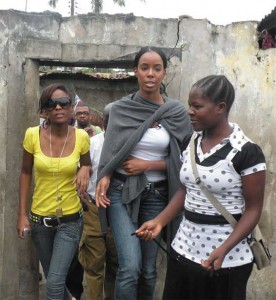

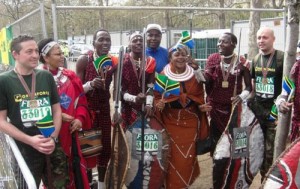
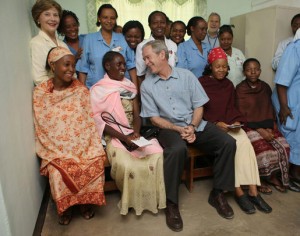 US president Bush at a health centre near Arusha
US president Bush at a health centre near Arusha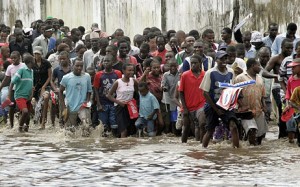 People braving torrential rain to see the Olympic Torch procession pass through Dar-es-Salaam
People braving torrential rain to see the Olympic Torch procession pass through Dar-es-Salaam